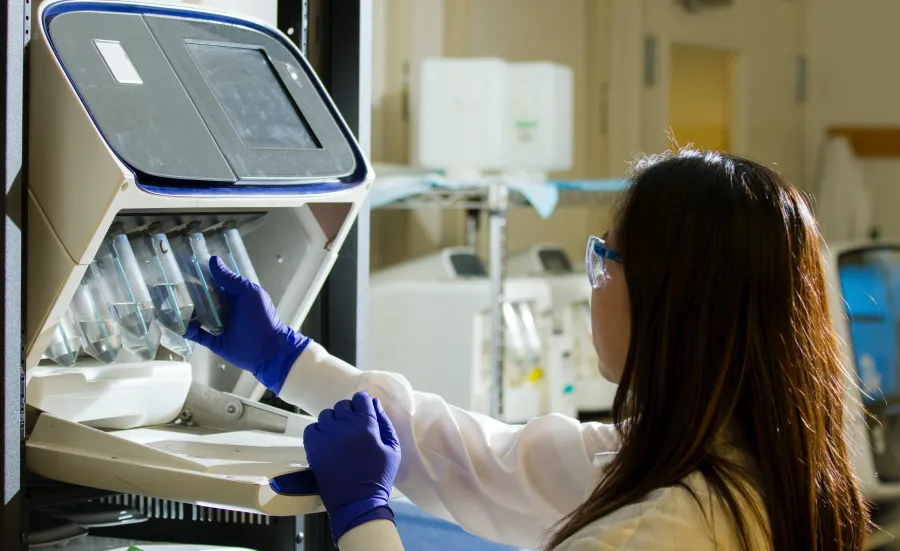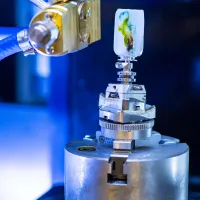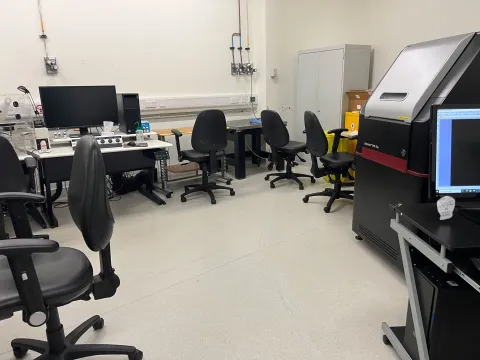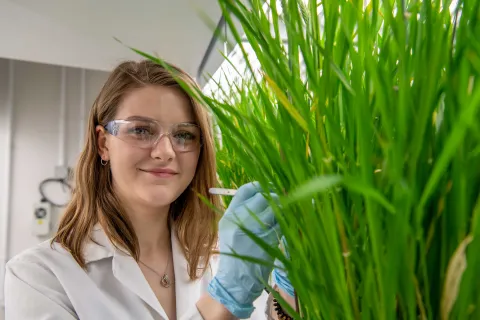Biological sciences

Work with a supportive team of expert academics and use the latest facilities on MPhil or PhD biological sciences research.

Work with a supportive team of expert academics and use the latest facilities on MPhil or PhD biological sciences research.

Biological Sciences at Southampton offers the latest learning and biological research facilities. 100% of our research has been rated world-leading or internationally excellent for its impact on society (REF, 2014).
Our research follows themes that focus on the causes and resolutions of some of the most substantial challenges facing humanity and the natural world today. You'll work with us on the latest scientific developments.
In our graduate school, you will also gain the broader personal and professional skills essential both for your PhD research and for your lifelong career choices.
We have a strong record of supporting postgraduate research students in this exciting and rapidly developing subject area.
We offer 2 PhD routes:
Apply directly through the university to an advertised project, or by proposing your own PhD idea.
Applying through one of our doctoral training partnerships (DTP). PhD projects are advertised with a title, supervisor, remit and funding already in place. Taking a structured studentship will give you access to additional training, conferences and secondments.
Our main areas of research are:
You can either apply for a structured studentship or propose your own PhD idea.
We offer our structured studentships in partnership with these DTPs:
If there are no projects advertised currently, we still welcome enquiries to potential supervisors to discuss projects and funding options.
This project will develop a new approach that simplifies quantitation of blood biomarkers. We will exploit the latest developments in DNA sequencing and antibody-DNA conjugation chemistry, to make it possible to simultaneously measure panels of biomarkers. This cutting-edge technology will be developed into affordable new clinical diagnostic tests.
This PhD project explores the application of advanced machine learning on wearable biosignal data, such as heart rate and activity levels, to enhance personalized health monitoring. Focus areas include multimodal data integration, real-time processing, and privacy-preserving techniques for predictive health insights, offering impactful advancements in personalized digital healthcare solutions.
We offer structured studentships in partnership with doctoral training centres, meaning you'll benefit from enhanced training and guaranteed funding. These studentships:
We offer scholarships and teaching bursaries ourselves. Your potential supervisor can guide you on what is available.
If you’re an international student you may be able to apply for a scholarship from your country.
Find out more about scholarships
Once you've found a supervisor, they can help you with potential funding sources. We offer match funding in some cases.
You'll need to state how you intend to pay for your tuition fees when you submit your application.
Find out more about funding your PhD
You can borrow up to £29,390 for a PhD starting on or after 1 August 2024. Doctoral loans are not means tested and you can decide how much you want to borrow.
Find out about PhD loans on GOV.UK
You may be able to win funding from one or more charities to help fund your PhD.
2022 to 2023 entry:
| UK | International | |
|---|---|---|
| Full time | £4,596 | £24,600 |
| Part time | £2,298 | £12,300 |
2023 to 2024 entry:
| UK | International | |
|---|---|---|
| Full time | To be confirmed | £25,500 |
| Part time | To be confirmed | £12,750 |
2024 to 2025 entry:
| UK | International | |
|---|---|---|
| Full time | £4,786 | £26,100 |
| Part time | £2,393 | £13,050 |
2025 to 2026 entry:
| UK | International | |
|---|---|---|
| Full time | To be confirmed Spring 2025 | £26,100 |
| Part time | To be confirmed Spring 2025 | £13,350 |
You're eligible for a 10% alumni discount on a self-funded PhD if you're a current student or graduate from the University of Southampton.
Our research institutes, centres and groups bring together specialists to share knowledge and solve problems.





Choose between the standard route or DTP route.
If you choose the DTP route you must apply through their website:
If you choose the standard route, email potential supervisors working within your field of interest to discuss potential PhD projects or writing your own proposal. It's best to do this well ahead of the application deadline.
You’ll find supervisors’ contact details listed with the advertised project, or you can search for supervisors in the staff directory.
You’ll need to send us


You'll need either:
If English is not your first language, you'll need an IELTS minimum level of 6.5 with a 6.0 in writing, reading, speaking and listening. Your awarded certificate needs to be dated within the last 2 years.
Visit our English language proficiency pages to find out more about other qualifications we accept.
If you need further English language tuition before starting your degree, you can apply for one of our pre-sessional English language courses.
Research degrees have a minimum and maximum duration, known as the candidature. Your candidature ends when you submit your thesis.
Most candidatures are longer than the minimum period.
| Programme | Full time | Part time |
| Biological sciences | 2 to 4 years | 3 to 7 years |
If you choose the DTP route, check their website for duration and part time or full time options: